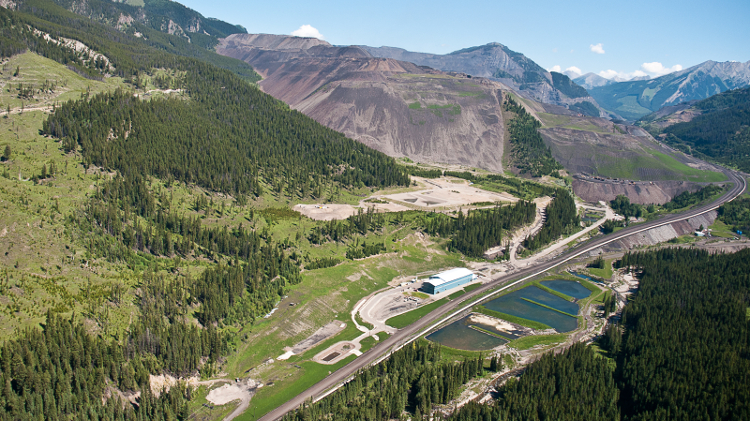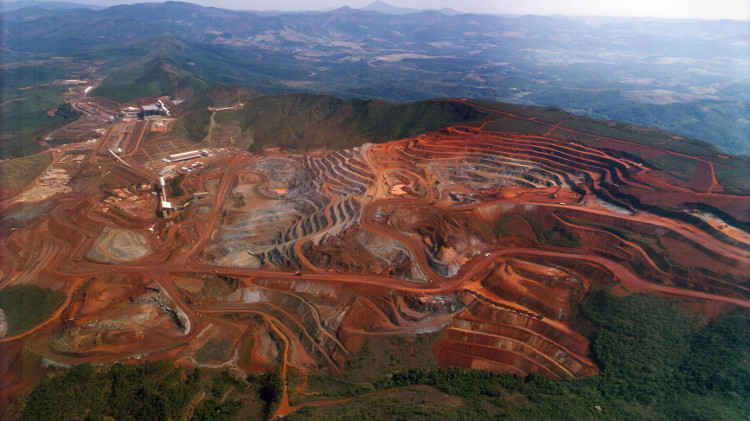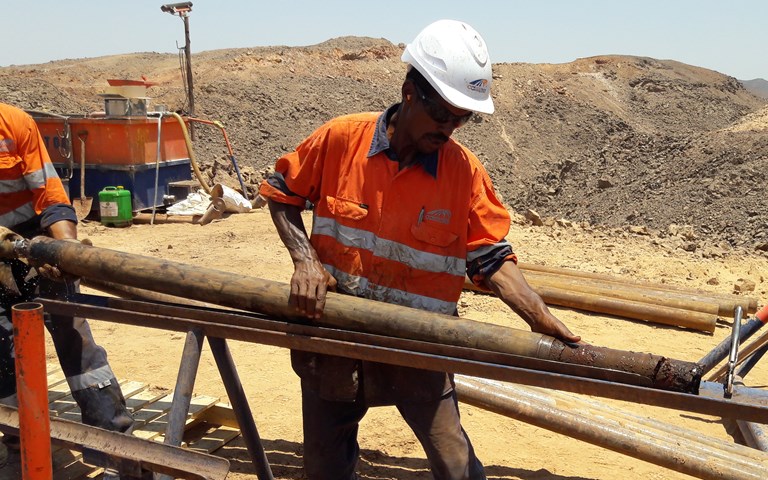Workers lay out fresh core at Aton Resources’ Hamama project in Egypt’s Eastern Desert. If the company’s plan for its concession works out, it would be one of only two companies operating a gold mine in the country | Courtesy of Aton Resources
Egypt opened its first gold exploration tender in eight years on Jan. 15, but some who work in the region question whether the terms the country has offered will be attractive enough to entice foreign investment.
Though the offer extends until April 20, the country may be at risk of having no bidders. All three gold mining companies already operating or exploring there have said they do not plan to place bids.
“The current terms on offer, in our view, are far more onerous than the previous two bid rounds and as such are unattractive to the investor,” Joseph El-Raghy, chairman of Centamin, said in an email to CIM Magazine. Centamin operates Sukari, Egypt’s only gold mine, located just over 20 kilometres inland from the Red Sea and about 300 km southeast of Luxor. (The mine, which began producing in 2009, has an expected 20-year mine life, and produced 551,036 ounces of gold last year.)
“We will not be tendering. The terms involve a lot of upfront payments that would be better spent in the ground,” seconded David Hall, CEO of Thani Stratex Resources Ltd., which has two concessions in the Eastern Desert. “It is unlikely that there will be any interest given that the three companies currently active have all said they will not tender.”
The concessions are mostly in the Eastern Desert between the Nile River and the Red Sea, and one area is open on the Sinai Peninsula, the area that borders Israel. The areas up for bid will likely have some older mines on them, said Mark Campbell, president and CEO of Aton Resources, formerly known as Alexander Nubia, which is exploring two sites on one concession in the Eastern Desert.
Aton will not be participating in the bid round so the team can focus on existing projects, according to Blaine Monaghan, vice-president of investor relations. In addition, Campbell said the terms of Aton’s existing claims are “much better” than what is offered in the country’s tender, “[making] these new terms even more bizarre.”
Despite a new mining law passed in 2014, the terms are most similar to those seen in the oil and gas industry, Campbell said, adding they do not address the constraints the mining industry faces.
“These production-sharing agreements are well known in the [oil and gas] industry and the economics make it easy to operate in because all of your costs are upfront,” he said. Unlike in mining, oil and gas operations tend to begin to make a profit within a few years and have lower operating costs once a connection to a pipeline is established.
According to the terms, Egypt forms a 50-50 joint venture between each company and the country’s mineral resource authority, EMRA, sharing a company’s profits after costs are recovered. There are several fees and bank bonds that must be paid before a company can begin work on a concession. Exploitation permits, given after a company declares it has made a commercial discovery, last 15 years and can be renewed for another 15.
However, the second 15-year period does not come with guaranteed tax relief. Egypt charges five per cent royalties.
“Combined, the proposed terms result in an effective tax rate that is by far one of the highest for mining globally,” El-Raghy wrote.
Aton paid to see detailed data and terms for bids – the price for information is US$6,000 per claim area. “These areas are interesting. The geographic size of them is huge,” Campbell said; one area is over 1,500 sq. km. “But for other people that might be looking at the potential exploration area, it’s hard for me to see how this would be attractive.”
Egypt’s mining history stretches back thousands of years; however, in the early 1960s, then-President Gamal Abdel Nasser nationalized the mining sector along with several other industries. By the end of the 1960s, the economy had stumbled; the mining sector suffered from the slowdown and from the migration of industry professionals out of the country.
The country has a number of mineral, gas and petroleum resources, most notably natural gas and crude oil. There are also tin, steel and phosphate producers in the country. Egypt held another bid round for lead and zinc, among other minerals, in 2015. “The geology is certainly here and the infrastructure is here,” Campbell said. Aton’s two projects, located 40 km from each other, are both accessible from the same four-lane highway. Power lines run through the area, and a water pipeline abuts the highway.
“We would love to see 150 companies working here,” he said. “A robust mining industry is good for us.”




